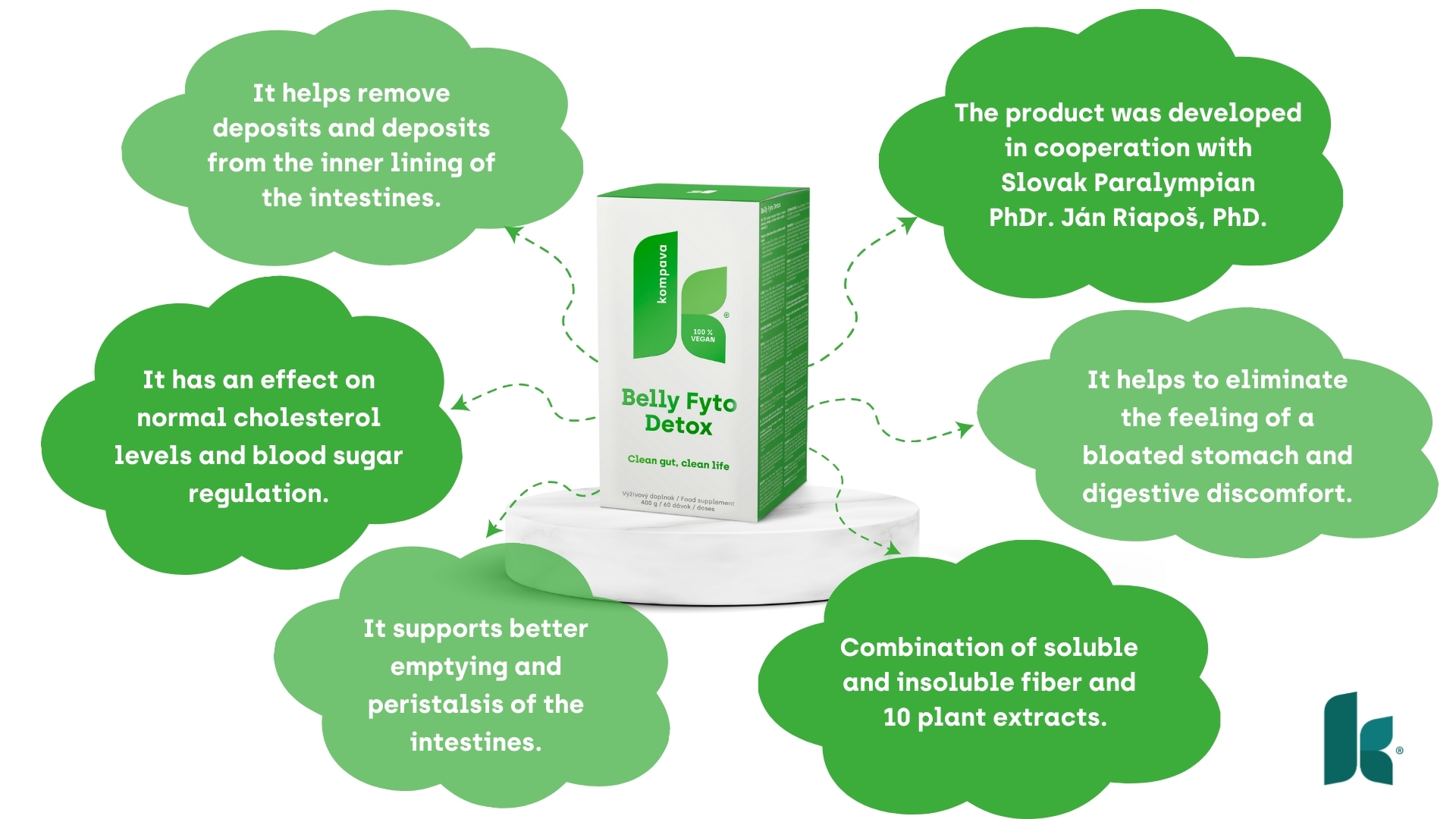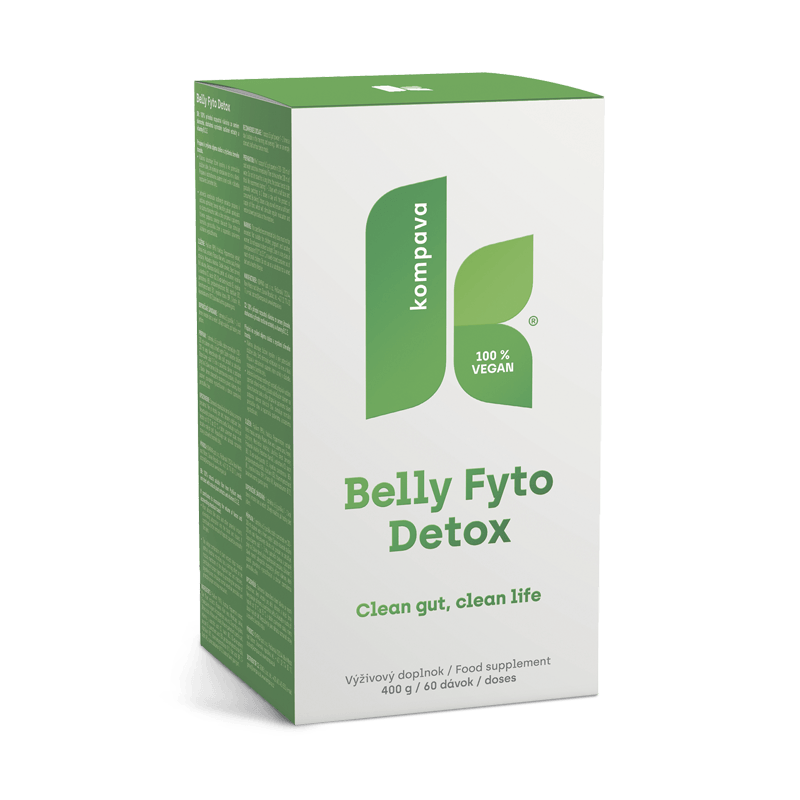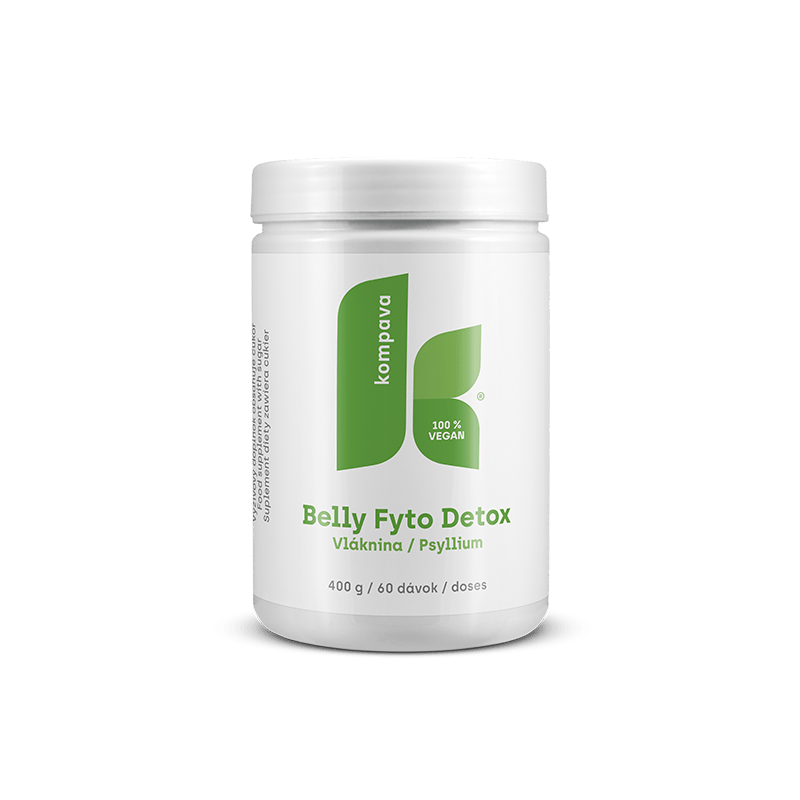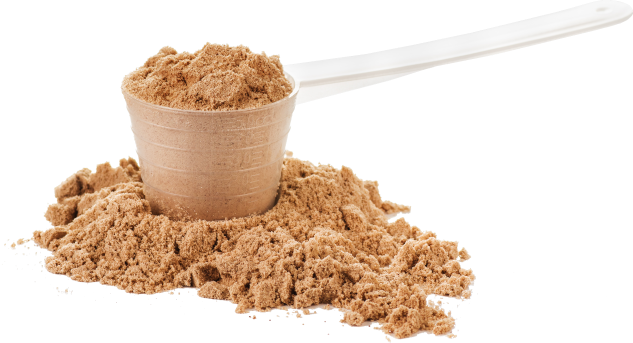
Belly Fyto Detox is a purely natural combination of soluble and insoluble fiber, which binds harmful substances in the process of digestion, thus eliminating their contact with the mucous membranes and absorption into the blood and tissues. Helps to remove deposits from the inner lining of the intestines, which have arisen as a result of an unhealthy lifestyle, which cleanses the intestines. Soluble fiber forms a gel with water, which slows down the digestive processes, thus ensuring longer gastric emptying and thus better absorption of nutrients. It has a positive effect on normal cholesterol levels and blood sugar regulation.

In 1998, the WHO recommended not to distribute fiber, as each food is a mixture of soluble and insoluble fiber. The unique combination of 10 plant extracts in Belly Fyto Detox contributes to optimal intestinal microflora, soothes the mucous membrane of the digestive tract and intestines, contributes to proper digestion by promoting the secretion of digestive juices, induces proper peristalsis (movement) of the intestines and helps proper and easy emptying.
The recommended daily intake of fiber is 25 to 30 g per day.
The content of 30 g of fiber is naturally found in 1.7 kg of apples or 1.1 kg of nuts, 3.4 kg of lettuce, 1.9 kg of potatoes, 4.3 kg of cooked spaghetti, 1 kg of bananas. If we are not able to consume a set amount of fiber through our diet, we can help ourselves with a simply prepared drink full of fiber and natural plant extracts. One dose of Belly Fyto Detox contains up to 5,2 g of fiber.
To maximize the beneficial effects of fiber, it is recommended to drink plenty of water.
The Belly Fyto Detox product was developed with the most successful Slovak Paralympian in summer sports - a four-time gold medalist from the Paralympic table tennis games PhDr. Ján Riapoš, PhD. two-time world champion (2010, 2017), ten-time European champion. Fiber is an important part of the diet for wheelchair users and has a positive effect on their health. Fiber helps maintain regular bowel function and reduces the risk of constipation, which can be a common problem for people with limited mobility.
"Slovak Paralympians also take energy from KOMPAVA."
Belly Fyto Detox contains:
- Psyllium ovato (plantain fiber)
It alleviates difficulties with defecation, contributes to the normal function of the intestinal tract and suppresses the desire for more food. When entering the intestinal tract, it acts like a spongy fiber, absorbs water in the digestive tract, thereby contributing to increasing the volume and improving the consistency of stool and to faster intestinal transit. - Flax flour
It is a source of fiber, protein, omega 3 fatty acids, B vitamins and the minerals calcium, magnesium, zinc and selenium. The fiber in flax meal can support healthy digestion and bowel function by increasing stool bulk and stimulating intestinal peristalsis. - Arctostaphylos uva-ursi
It contains substances attributed to anti-inflammatory and antioxidant properties that can help reduce inflammatory conditions in the digestive tract and promote healing of digestive problems. Bearberry is traditionally used to relieve digestive problems such as heartburn, bloating or nausea. At the same time, it has a positive effect on the activity of the bladder and kidneys. - Glycyrrhiza glabra L.
It has a beneficial effect on the mucous membrane of the stomach and intestines. It helps with excessive acid production in the stomach and subsequent gastric and duodenal ulcers. Accelerates intestinal peristalsis. - Ulmus fulva
It contains bioactive compounds with a high content of mucilaginous substances, which have a calming effect and thus have a positive effect on the irritated mucous membrane of the digestive tract. - Aloe Vera
It can improve digestion by promoting the production of digestive enzymes and stimulating intestinal peristalsis. These effects can help eliminate bloating and aid in better digestion. Aloe Vera ensures a normal blood sugar level, has a positive effect on the immune system and the overall function of the intestinal tract. It regenerates, hydrates, soothes and nourishes cells. - Rheum palmatum L
It is rich in fiber, which is important for the proper functioning of the digestive system. Certain substances contained in palm rhubarb can promote the production of digestive enzymes, which improves food digestion and nutrient absorption. - Althaea officinalis
It has mild laxative properties, which means it can help relieve digestive problems such as constipation and loose stools. It also relieves the irritation of the mucous membrane caused by inflammation in the digestive tract. - Peppermint
Peppermint oil can help relieve various digestive problems, such as heartburn, bloating, nausea, or constipation. The menthol contained in peppermint has a mild muscle relaxant effect, which can help relieve muscle spasms and abdominal muscle pain associated with digestive problems. - Alfaalfa
Alfalfa seeds are rich in fiber and contain enzymes that help break down food and promote better absorption of nutrients. T. It affects the normal level of cholesterol in the blood, has a positive effect on emptying, flatulence, cramps and comfort during menopause. - Fennel
It supports the reduction of bloating, improves digestive functions and relieves digestive problems such as heartburn or cramps, acts against bloating, has a beneficial effect on emptying. Its anti-inflammatory properties contribute to the overall health of the digestive tract. - Papaya
It contains the enzyme papain, which helps break down proteins and improve digestion. In addition, papaya is rich in fiber, vitamins and minerals. - Vitamin E
Vitamin E is an antioxidant that plays an important role in the health of the digestive system. Although it does not directly affect the digestion process, its anti-inflammatory and protective effects can have a positive effect on the digestive tract. Vitamin E can protect cells in the digestive tract from damage caused by free radicals and inflammatory processes, which can help maintain healthy digestive system function. - Vitamins B1, B2, B6, B12
These vitamins are essential for the proper functioning of metabolic processes, which are key to digestion and absorption of nutrients from food. A lack of these vitamins can lead to digestive disorders, such as indigestion of carbohydrates, fats and proteins, which can result in various digestive problems such as bloating, constipation or irregular stools. - Vitamin C (ascorbic acid)
They can help protect cells in the digestive tract from damage caused by free radicals and inflammation. In addition, vitamin C is essential for the synthesis of collagen necessary for the formation and repair of tissues in the digestive tract. Vitamin C deficiency can lead to a variety of digestive problems, including increased susceptibility to infections, slower wound healing, and digestion problems.












